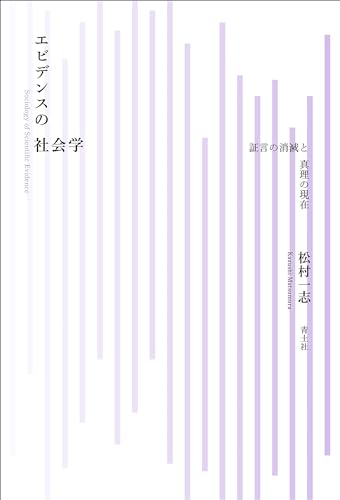7 0 0 0 IR 実験報告の修辞学 : 19世紀後半の心霊研究と「裁判のレトリック」
- 著者
- 松村 一志
- 出版者
- 東京大学大学院総合文化研究科国際社会科学専攻
- 雑誌
- 相関社会科学 = Komaba Studies in Society (ISSN:09159312)
- 巻号頁・発行日
- no.28, pp.3-16, 2019-03-01
In this paper, I examine the transformation of rhetorical strategies in experimental reports in the late nineteenth century. Steven Shapin and Simon Schaffer's canonical work Leviathan and the Air-Pump (1985) has demonstrated that early experimental scientists such as Robert Boyle had to adopt the "rhetoric of trial," a lost literary technique with which experimental reports were compared to testimony in court, due to the lower status assigned to observation and experiments. While subsequent researchers have analyzed how this sort of rhetoric was used in the seventeenth century, the era of "scientific revolution," few have focused on the rise and fall of the" rhetoric of trial" afterward. In response, I try to show when and how this rhetoric disappeared. For this purpose, I focus on a branch of experimental science called psychical research. Though psychical research is now seen to be a typical example of pseudoscience, it attracted many famous scientists in the fin de siècle, inspiring huge debates on the reliability of experimental reports. Psychical researchers frequently used the "rhetoric of trial" to justify their reports. However, this rhetoric began to lose its persuasiveness with the rise of experimental psychology and statistical testing. From this episode, I reconsider the origin of current norms in scientific experiments such as reproducibility.一般論文
4 0 0 0 OA 社会構成主義をどう評価するか?――科学的実在論と反実在論の二分法を再考する――
- 著者
- 松村 一志
- 出版者
- 関東社会学会
- 雑誌
- 年報社会学論集 (ISSN:09194363)
- 巻号頁・発行日
- vol.2018, no.31, pp.72-83, 2018-08-25 (Released:2019-08-29)
- 参考文献数
- 48
In this paper, I re-evaluate the theoretical implications of social constructivism, which has persisted as the most influential movement in science studies for more than 30 years. Social constructivism has been perceived as being antirealist, a school of thought that denies the reality of the world. Although antirealism has been criticized by scientific realists, who believe that the sciences can define reality whereas religion and pseudo-sciences cannot, the dichotomy of realism and antirealism that philosophers of science often impose is problematic because, in a philosophical sense, social constructivism is neither realism nor antirealism. In response, in this paper I introduce the term anti-antirealism to clarify theoretical claims that the dichotomy of realism and antirealism have blurred.
1 0 0 0 OA 「科学的」という言葉とその機能
- 著者
- 松村 一志
- 出版者
- 科学社会学会
- 雑誌
- 年報 科学・技術・社会 (ISSN:09199942)
- 巻号頁・発行日
- vol.23, pp.85-111, 2014-06-30 (Released:2022-09-10)
1 0 0 0 エビデンスの社会学 : 証言の消滅と真理の現在
- 著者
- 松村 一志
- 出版者
- 成城大学大学院文学研究科
- 雑誌
- コミュニケーション紀要 = Seijo communication studies (ISSN:02887843)
- 巻号頁・発行日
- no.33, pp.69-71, 2022-03-18
1 0 0 0 OA 実験報告の修辞学 : 19世紀後半の心霊研究と「裁判のレトリック」
- 著者
- 松村 一志
- 出版者
- 東京大学大学院総合文化研究科国際社会科学専攻
- 雑誌
- 相関社会科学 = Komaba Studies in Society (ISSN:09159312)
- 巻号頁・発行日
- vol.28, pp.3-16, 2019-03-01
In this paper, I examine the transformation of rhetorical strategies in experimental reports in the late nineteenth century. Steven Shapin and Simon Schaffer’s canonical work Leviathan and the Air-Pump (1985) has demonstrated that early experimental scientists such as Robert Boyle had to adopt the “rhetoric of trial,” a lost literary technique with which experimental reports were compared to testimony in court, due to the lower status assigned to observation and experiments. While subsequent researchers have analyzed how this sort of rhetoric was used in the seventeenth century, the era of “scientific revolution,” few have focused on the rise and fall of the“ rhetoric of trial” afterward. In response, I try to show when and how this rhetoric disappeared. For this purpose, I focus on a branch of experimental science called psychical research. Though psychical research is now seen to be a typical example of pseudoscience, it attracted many famous scientists in the fin de siècle, inspiring huge debates on the reliability of experimental reports. Psychical researchers frequently used the “rhetoric of trial” to justify their reports. However, this rhetoric began to lose its persuasiveness with the rise of experimental psychology and statistical testing. From this episode, I reconsider the origin of current norms in scientific experiments such as reproducibility.
